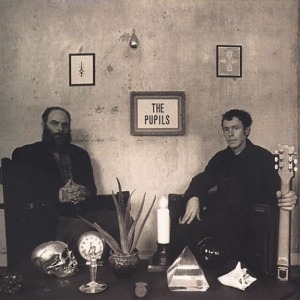
Dischord Records cult favorites Lungfish haven’t released anything since 2005’s Feral Hymns, but its members continue to channel that group’s unique energy into their recent projects. Punk rock prophet Daniel Higgs has explored distorted mouth-harp, cosmic gospel folk, and meditative chants in a string of predictably confounding solo albums. These ventures recently culminated in a welcome return to rock with The Skull Defekts’ excellent Peer Amid. Former bassist Nathan Bell, who anchored personal favorite The Unanimous Hour, occasionally echoes Lungfish’s instrumental plateaus in Human Bell. But the most elemental evocation of Lungfish’s repetitive melodies comes in guitarist Asa Osborne’s solo project Zomes, now on its second LP, Earth Grid.
There’s no getting around the surface-level simplicity of Osborne’s Zomes. Each song is a modal exploration using keyboards and tape-looped drum beats. There’s no clutter of overdubs, no latticework of intersecting melodies, no polyrhythmic swirl. Songs last as long as necessary—ranging from fifty seconds to five minutes—although a two-minute composition may feel just as long its four-minute counterpart. Recorded at home to cassette, Earth Grid’s muted lo-fi palette gives a feeling of a third-generation dub or a live performance recorded by a downstairs neighbor.
Yet much like Lungfish, the mesmerizing quality of Zomes’ meditative compositions defies their innate simplicity. The droning, lightly distorted keyboard melodies are curiously inviting, with only a brief trill at the beginning of “Step Anew” approaching abrasion. The fourteen songs fit together as one piece, yet each one offers a tonal variation. Listening to the appropriately titled lead-off track “Openings” will give you a good sense of what’s to come, but each song could be pointed out as a valid starting point.
Zomes’ Earth Grid makes the most sense when viewed as a chronological aberration in Lungfish’s evolutionary arc. Instead of being a postscript to that group’s gradual dismissal of unnecessary traits, Zomes is the primordial goo which evolved into the mighty beast. This circular development is perfectly appropriate for Lungfish, especially given the epochal “Creation Story” from Rainbows from Atoms (“As a fish realized it held a monkey inside itself / And expelled it on the beach in a larval salamander form”). The clear benefit of such prior contextual knowledge makes Earth Grid less of a starting-point recommendation for the greater world of Lungfish than The Skull Defekts’ Peer Amid, but embrace that circularity: at some point you’ll come back here and begin anew.
|

Since the mighty Lungfish’s last (but hopefully not last) LP, 2005’s Feral Hymns, its punk-rock shaman/vocalist Daniel Higgs has released no fewer than seven decidedly outré solo records. (It’s hard to keep track of limited-edition, cassette-only entries.) If Lungfish’s ultra-repetitive punk-rock meditations are an acquired taste, Higgs’ ventures into distorted mouth-harp jams, cosmic/religious folk songs, and bizarre banjo instrumentals are the musical equivalent of Anthony Bourdain’s travels on No Reservations. Higgs can make those excursions palatable, but I still long for something resembling meat and potatoes. Fortunately, his newest turn as the frontman for Swedish post-punkers The Skull Defekts is an unexpectedly expected return to genuine—if twisted—rock music.
All of this build-up would be irrelevant if Higgs’ idiosyncratic vocal style failed to coalesce with The Skull Defekts’ experimental brand of post-punk. But the biggest surprise for Peer Amid is the naturalness of the pairing. You won’t mistake Peer Amid for a lost Lungfish LP, but hearing Higgs’ incantations of primitive mysticism linger over the unwavering intensity of the Skull Defekts’ locked-in rhythms, raga-informed guitar riffs, droning menace, and tribal percussion feels like a logical progression from his past work. Don’t fret if you come to Peer Amid without prior knowledge of Lungfish, Higgs, and the Skull Defekts’ considerable discographies—it’s just as valid of a starting point for newcomers.
Peer Amid covers considerable ground from the opening creaks of Higgs’ voice on the title track to the closing repose of “Hidden Hymn” (provided you’ve picked up the 2LP version with this bonus song and an alternate track order). “Peer Amid” circles mercilessly over its nine-minute runtime, lashing out with occasional venomous strikes, but the overall effect is less of a vicious assault and more of a suffocating constriction. “No More Always” is an energetic, raga boogie—a nihilistic hit single on some distant world of lizard people. The droning “Gospel of the Skull” finds Higgs ruminating on “your resonating skull sound” like no one else on earth could. The wordless chants of “The Silver River” evoke Indiana Jones peering in on the sacrificial rites of an evil cult. The eight-minute “In Majestic Drag” treats Higgs’ otherworldly cries as another element in an unnerving soup of tribal drumming, buzzing electronics, and malfunctioning guitar riffs. CD closer “Join the True” pairs Higgs’ unsettlingly calm delivery (“Join the true / Easy to do / Be as one / Who passes through”) with another hypnotic groove as you’re indoctrinated into this bizarre cult.
Time will tell if Daniel Higgs’ collaboration with The Skull Defekts is a one-off or an ongoing venture. The circular nature of these compositions—that tail-eating snake on the cover is no accident—might imply that Peer Amid is a closed loop, but I’d prefer if this collaboration continues. It won’t stop Higgs from venturing into the great beyond for inspiration, but it will provide a more accessible gateway for those interested in his cosmic sermons.
If you’re holding out hope for a Lungfish reunion, the current Skull Defekts tour offers you a tease. Lungfish guitarist Asa Osborne’s Zomes solo project opens up for the Higgs-equipped Skull Defekts. Maybe you’ll get a few quick performances from Higgs and Osborne’s The Pupils.
|
The Pupils – The Pupils LP – Dischord, 2002 – $3.20 (Newbury St. Newbury Comics, 4/17)

As an extension of Daniel Higgs and Asa Osborne’s main group, Dischord mainstays Lungfish, the Pupils are to a large extent argument-proof. Opinions may vary on the quality or importance of the Lungfish’s minimal, repetitive punk-rock and mystic incantations, but the chances that any of those opinions will affect the group’s gradual evolution are nil. You’re either on board or you’re not. You are far more likely to change than they are. I speak from experience on that last point, having looked upon a few stray Lungfish songs as a curious offshoot of DC punk rock back in high school, only to have The Unanimous Hour finally click a few years ago. It’s not that they don’t change—there’s a noticeable arc to their career, starting out with the aggressive punk of Necklace of Heads and Talking Songs for Walking, progressing to the honed precision of Indivisible, and finally to the garage minimalism of Feral Hymns—but this evolution never feels haphazard or forced. If anything, I’d call it erosion, not evolution, since tendencies are stripped away, the flesh made bare over the course of time.
Another terminology correction: earlier I called The Pupils an extension of Lungfish, not a side project, and this specification is critical. At no point during The Pupils did I get the sense that Higgs and Osborne were out to try something overtly new with this name. It’s Lungfish without a rhythm section. While many listeners would be upset at this specification, hoping for a different take on Lungfish’s signature combination of minimalism and mysticism, it makes perfect sense to me. There are certainly gentler moments than usually appear on Lungfish LPs, specifically “It’s Good to Have Met You” and “I Will Remain Human for Another Day,” but these are just as wonderfully confounding as any Lungfish song. The former has an atypically romantic notion in “It’s good to have loved you my sweetheart / It’s good to hope that we should never have to part,” but it fits into a cycle of bonds recalling Lungfish’s “Hallucinatorium.” "I Will Remain Human" reaffirms the oddity of Higgs’ lyrics with “We’re hand in hand at the horizon / We gird our loins for teleharmonizing” even as it circles back on the seemingly loving territory of “It’s Good to Have Met You.” There’s plenty of other quirks to be found, like “Witness the Sidewalk Weeping Pools of Martian Brine,” which is just long enough to recite the title, but The Pupils never feels shoddy or tossed-off.
Perhaps I’m giving Higgs/Osborne/Pupils/Lungfish too much leeway because of their idiosyncratic nature, but it’s honestly refreshing to hear an album and not have my critical impulses emphasize what I would’ve had them do differently. (I leave such impulses to Daniel Higgs’ solo work, where my critical impulses say “Stop playing the mouth harp already.”) The Pupils does exactly what I expected and yet it’s not limited to my expectations, a typically Lungfish mind-bender.
|
|

